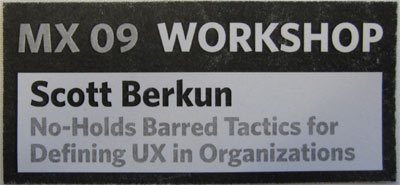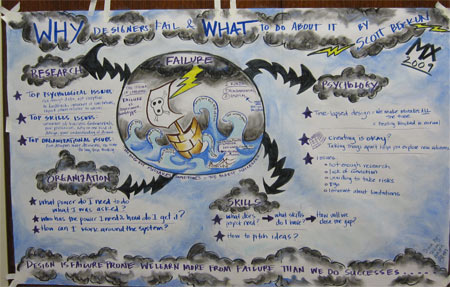Here’s a good one from the mailbag:
I am seriously considering quitting the (day) job and dedicate myself to my consulting activities but, it’s scary decision. On one hand I feel it’s the right time. I have no family nor other important obligations and in a few years it’ll be too late. But on the other hand the cost of living where i live and the financial crisis make me hesitate.
Do you think that today’s crisis should affect this type of decision? Any insights you can provide me on your decision would be very appreciated.
Big decisions are always scary no matter what’s going on in the world. You’d be nearly as scared in boom times to quit as you probably are now. Keep this in mind. Much of the fear is yours. I know mine was. It’s easy to say “oh, it’s not the right time” as if there could ever be a perfect time. No angel is ever going to drop down from the sky and say “Quit now! It’s time! The universe has your back”, yet people seem to expect it will feel like this. It will always feel scary, weird and uncomfortable because it is new. And after the stability of a proper career, something you likely worked hard to get, it goes against the grain of our cultural attitudes to abandon that for the unknown.
Now I’m not saying everyone should quit today – far from it – but I am saying there is this fantasy about what it should feel like that can never possibly happen.
In short, going out on your own you only need one thing: enough clients to earn a living. That’s it.
Depending on what you intend to do this could be one single client. Or three. Getting one or three clients might be very easy for you. Or very hard. But either way you can start figuring out how hard or easy it will be before you quit your regular job. The quality of your business idea and talents are things you can measure no matter what the state of the world is. If you see a way to make money, can verify it, can get good businesses to sign contracts to pay you, then why wouldn’t you do it? Recessions or depressions are macro trends: there are always countervailing micro trends and that’s all you need to find.
The major advantage of being an independent is your low overhead and agility. You only need to pay one salary and that’s yours. You don’t need to build a factory or find investors – your constraints are much simpler. Even in down times if you see an opportunity to provide a service people need, and can pay for, you can do very well. Strong businesses are relatively stronger now given all the troubles weaker companies are in. Even during global downwards trends there are always pockets of opportunity and sometimes the people who strike out on their own during tough times, and survive, are best positioned to do well in boom times too.
Here’s a basic and time tested approach to all this:
- What are you lowest possible expenses for the next 12 months. Do the math on how much you need to survive. Note all the frills you can cut, like cable TV, nights out on the town, skiing trips, moving to a cheaper apartment, etc. Put together your lean expenses for a year. If you have new business expenses you expect to spend before you can make income, consider those too.
- Examine your savings. Based on #1, you know how much you need, assuming ZERO income, to last for a year. Look at your savings and do the math. If you find zero clients, how long can you last? A good guess is you need 6 to 12 months to build a base of clients. If you don’t have 6 months of savings, start saving now. Without a cushion you will have little margin for error, which you’ll need because you are doing something new and will make some mistakes along the way. Account for this before you start.
- Be clear on what you want. Is it more autonomy? Is it more free time? Is it to have so much money you can wear clothes made from $100 bills? Think carefully about what you are trying to achieve. Simply ‘not working for the man’ anymore isn’t much of a target to aim for. I quit for more autonomy – I was sick of needing approvals for things. I also wanted to see if I’d like writing books and if I did, could I make a living around them. I decided if I could do that and live acceptably well, I’d be happy. So I quit.
- Find your support team. Ask your friends, your spouse, your colleagues, and find a small group of people who will support you and help you out as you start this new thing. You will need to know who can help when need it, who will encourage you and who will give you tough feedback you need to hear. Line up your support team before you make the leap. It might surprise you how people react to your decision, so sort it out early. Groups like biznik.org or even more general networks like linkedin can connect you with like-minded people who can give you advice, support or who are a little ahead of you in the process. Blogging is an easy way to make connections and draw attention to your work, provided you like to write, or more importantly, write well.
- Start looking for clients. Ask around. Of your network, who are the five people most likely to need your services. Talk to them. Ask them if you were a freelancer if they’d be interested. Talk to other freelancers in your field – buy them lunch and ask for advice. Do they like being on their own? Why? Why not? Before making the leap become a student of freelancers in your field and sort out if your fantasies about it approximate the reality. Start working your network and building it now. Start a blog about your expertise: it creates a home for your knowledge and if you go on your own, your business.
- Get your first client fast: work for free. A good referral is worth much more than payment for a new independent. Be willing to work for free, on the basis it’s a limited time only arrangement, in exchange for a good referral or use of a client’s network (If you can’t find someone willing to let you work for free, be worried: your network or reputation are weak). You can do this on weekends or when off from your current job. Get projects under your belt now, while you have almost no risk. If after two weekend projects you hate it, you’ve learned, before quitting, freelancing isn’t for you. Get a taste for free before you mortgage your house for the meal.
- Leave your job on good terms. Give plenty of notice, more than the minimum (Wouldn’t you be pissed if someone gave you only two weeks notice?). Finish all your work. Make sure you do everything you can to leave on excellent terms so worst case the door is open for your return, or to possibly use your former employer as a client.
- Value life experience. When I quit it helped me to accept that even if I fail I’d have learned a great deal about myself, my industry and life in general. I was convinced there were lessons I’d learn I couldn’t buy any other way, and I got strength from this (It turned out I was right, but I didn’t know this when I quit). I was convinced on a personal level I could not lose, and if I planned #1 and #2 the financial risks were small. Worst case I’d take those experiences and return to the kind of career I’d had before, but much wiser and appreciative of what I have.
I’d also check out books like Million Dollar Consulting, which outline many of the considerations needed to run a successful consulting or freelance business. And Guy Kawasaki’s Art of the Start is a good starting point if you’re thinking along the lines of a business rather than consulting.
Also see: How I make a living – in detail.
Have more questions? Leave ’em in the comments.



